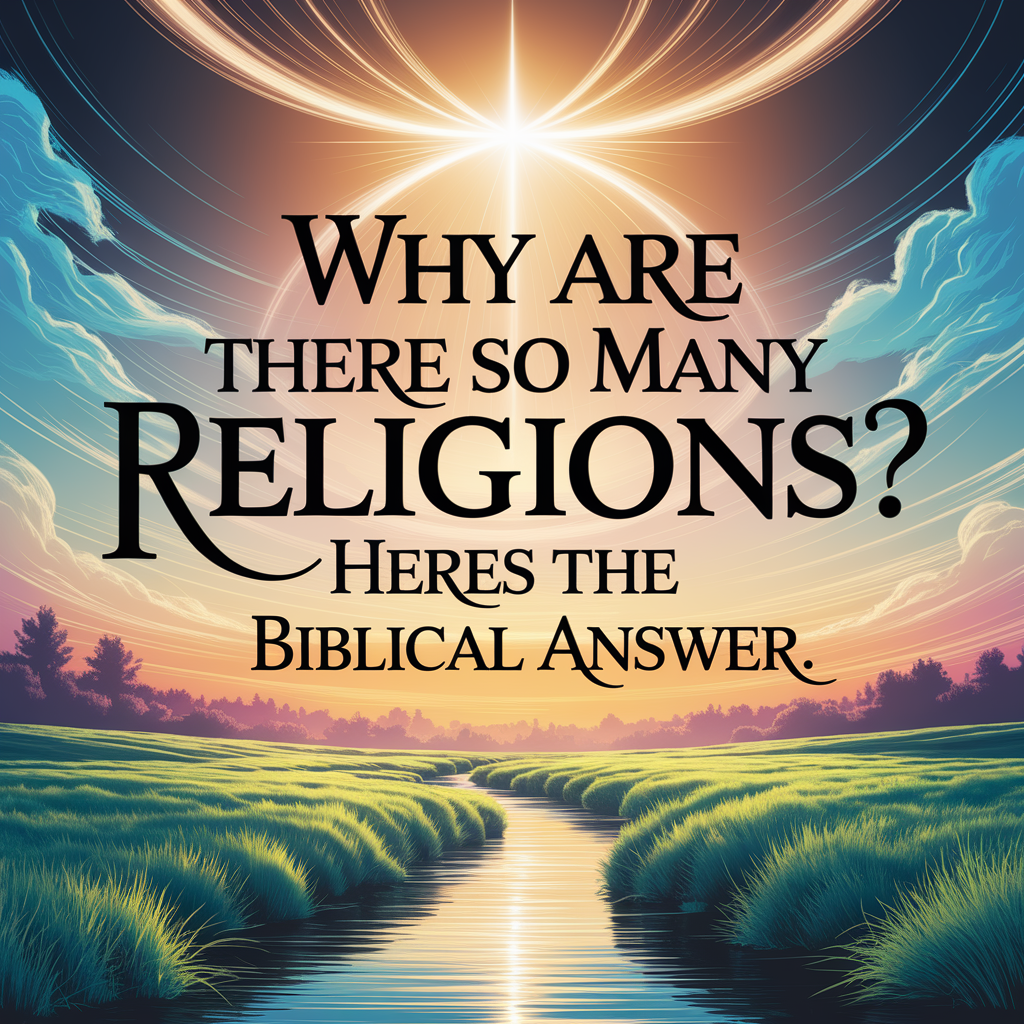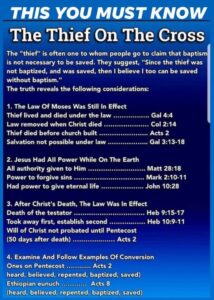
This Question Gets Asked More Than You Think
I can’t tell you how many times I’ve heard it—“Why are there so many religions?” Maybe you’ve wondered that too. I sure did, especially when I was younger and trying to figure out what truth even meant.
There are thousands of religions in the world, each with their own beliefs, stories, rituals, and “gods.” And when you’re trying to find the truth, it can feel overwhelming. You might think, “How can any one group claim to be right when so many others exist?”
But here’s what I’ve learned: just because something is common doesn’t mean it’s true.
Proverbs 14:12 says,
“There is a way that seems right to a man, but its end is the way of death.”
That verse stopped me in my tracks the first time I read it. Because it reminded me that what feels right or looks right isn’t always what is right—especially when it comes to eternity.
That’s why I wrote this article about how to know the Christian path is the right one. The world says truth is relative. God says it’s not.

Why So Many Religions Exist in the First Place
If God is real and truth is absolute, then why would He allow so many religions to exist? I used to think that too—until I looked back at Genesis 11, the story of the Tower of Babel.
People didn’t want to honor God—they wanted to be like God. So they built a tower, not to worship, but to control. God scattered their language and their unity, and from there, different cultures, nations, and belief systems began to grow.
But that wasn’t God’s fault—it was man’s rebellion.
Religion is often man’s attempt to reach up to God on his own terms.
Christianity is different. It’s about God reaching down to us through Jesus.
Every false religion shares a pattern: “Do this to be good enough. Climb your way up.” But the Gospel says, “You’ll never be good enough. That’s why Jesus came down.”
So when people ask why there are so many religions, I believe the answer is this: because people are searching for meaning, but rejecting the only One who can give it.
And that’s exactly why this explanation of salvation and truth is something every seeker needs to read.

The Difference Between Religion and Relationship
Here’s what changed everything for me: Christianity is not about religion—it’s about relationship.
Religion says, “Earn your way to God.”
Jesus says, “I came to you because you couldn’t.”
That’s the major difference that sets biblical Christianity apart from every other belief system. While most religions are built on human achievement, Christianity is built on divine grace.
John 14:6 makes it clear. Jesus said,
“I am the way, the truth, and the life. No one comes to the Father except through Me.”
He didn’t say He was a way or one of many truths—He said He is the way.
So many people get turned off by “religion” because it feels cold, heavy, or fake. I get it. But Jesus isn’t calling us into a lifeless set of rules—He’s calling us into relationship with Him, bought by His blood.
If you’ve ever felt burned out by religion but still hungry for truth, this article on Jesus being the only way to heavenspeaks straight to that tension.

Do All Religions Lead to God?
This one can be uncomfortable to answer, especially in today’s culture. The world loves the idea that “all paths lead to the same place,” but the Bible says otherwise—and Jesus was bold enough to say it out loud.
Acts 4:12 says:
“Nor is there salvation in any other, for there is no other name under heaven given among men by which we must be saved.”
That verse doesn’t leave room for multiple saviors or spiritual shortcuts.
I used to think sincerity was enough. If someone really believes something, that should count for something… right? But the truth is, you can be sincere and still be sincerely wrong.
Not every road leads to God. Many lead people further away.
That’s why I encourage anyone asking these questions to start with the Gospel itself. If you haven’t yet, this step-by-step guide on salvation breaks it down clearly—straight from Scripture.

Why Christianity Stands Alone
Out of all the world’s religions, only Christianity has a risen Savior.
Think about that for a second. No other religious founder claimed to be God in the flesh, lived a sinless life, died a substitutionary death, and then rose from the grave with eyewitnesses to prove it.
That’s not myth—that’s history.
Christianity isn’t based on feelings or philosophy. It’s rooted in fulfilled prophecy, verifiable events, and the radical message that salvation isn’t something we earn—it’s something we receive.
I’ve seen people try to group Christianity in with other belief systems, calling it “just another religion.” But nothing else compares to the message of the cross.
Want proof? This article on the historical accuracy of the Bible will show you how deeply supported Scripture really is.
We’re not believing in fairy tales—we’re trusting in real truth that has stood the test of time.

What About People Raised in Other Religions?
This is a hard question, but it’s one that matters. What about someone born into a different faith? What if they were never taught about Jesus?
First, I trust that God is both just and merciful.
Romans 1:20 says,
“For since the creation of the world His invisible attributes are clearly seen… so that they are without excuse.”
God makes Himself known. Through creation, through conscience, and yes—through Christ. Anyone who truly seeks Him with a sincere heart will find Him (Jeremiah 29:13).
But that doesn’t mean all religions lead to truth. It means God gives every person a chance to respond to the light they’ve been given.
That’s why it’s so important to share the Gospel. And if you want to dig deeper into eternity and what happens after this life, this article about the afterlife through a biblical lens breaks it down clearly.
The goal isn’t to judge others—it’s to make sure we’ve found truth ourselves… and then lovingly share it.

What You Can Do With This Truth
If you’ve ever wondered why are there so many religions, you’re not alone—and it’s not a dumb question. In fact, it might be one of the most important questions you ever ask.
Because once you realize not all religions are the same, it forces you to wrestle with a deeper truth: what if there really is only one way?
Jesus didn’t leave room for confusion when He said,
“I am the way, the truth, and the life. No one comes to the Father except through Me.” (John 14:6)
You don’t have to understand every religion to know which one is true. You just need to know Jesus—and He will open your eyes to everything else.
So where do you start?
- Get into the Word. If you don’t have one yet, I highly recommend a personalized NKJV Bible you’ll actually use.
- Follow a plan. This printable Bible study PDF is perfect for helping you build a habit.
- Start with what matters most—understanding what salvation truly means.
The world has a lot of voices. But only one voice leads to life.

Questions People Ask About Religion, Truth, and Christianity
These are the kinds of things people ask Google when they’re searching for truth—and maybe even when they’re quietly doubting. Here’s what I’ve learned through God’s Word, experience, and honest reflection:
Can all religions be true?
This sounds appealing, especially in today’s culture of tolerance and “your truth vs my truth.” But logically—and biblically—it’s impossible.
Different religions contradict each other. Christianity says Jesus is God. Islam says He’s not. Buddhism doesn’t believe in a personal God at all. They can’t all be true if they directly oppose each other.
Truth, by nature, excludes what is false. That’s why Jesus said He is the truth—not one of many.
I unpack this further in this article on what Jesus says to people who doubt. If truth matters, we need to care about these differences.
Isn’t it arrogant to say Christianity is the only way?
I wrestled with this. But then I realized—it’s not arrogance to believe what Jesus Himself said. If someone rises from the dead, they earn the right to be trusted.
Jesus didn’t come to start a religion. He came to rescue people from their sin.
Believing what He said isn’t arrogant—it’s obedience.
And when we truly believe Jesus is the only way, we don’t look down on others—we feel a deep urgency to lovingly tell them the truth. This article about boldly sharing truth without pride speaks to that perfectly.

Why does God allow false religions?
Because He gives us free will.
God didn’t create robots. He gave humanity the ability to choose—and sadly, many have chosen to create their own versions of “truth.” But God still calls, reveals, and reaches. He is patient. He is just. And He desires that all come to repentance (2 Peter 3:9).
That’s why I believe articles like this one on God’s patience and love are important. They show that even in a world of confusion, God’s heart is still to save—not to condemn.
What if someone sincerely believes in the wrong religion?
Sincerity is not the standard. Truth is.
You can drink a glass of poison sincerely thinking it’s medicine—but it will still harm you. That’s why the Bible says salvation is found in no other name but Jesus (Acts 4:12).
God doesn’t ignore sincerity—but He calls people to truth. This reminder about salvation and the urgency of knowing Christ helps explain why eternity matters more than our feelings.
As an Amazon Associate we earn from qualifying purchases through some links in our articles.



